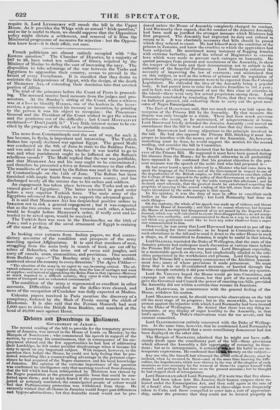NEWS OF THE WEEK.
A GENERAL description of the week's proceedings in Parliament, may be given in one sentence : Ministers have been defeated on a
bill by which.tbey declared their determination to stand or fall— have shirked important but embarrassing questions—and carried two jobs triumphantly through the Commons. Now for the par- ticulars.
The Lords permitted the second reading of the Jamaica Bill, giving due notice that in Committee it would be cut up. Lord
LYNnutiasr commenced the process of mutilation. Ile went to
work like an experienced operator, and with characteristic coolness skinned and dissected the measure, taking care to exhibit its foul- ness and deformity, while he kept the sound parts out of sight. lie spoke as the advocate of the Jamaica Assembly, not as a statesman and legislator on a grave question affecting high interests of the mother country and one of her principal colonies. One general prin-
ciple, however, be enunciated, and applied to the subject hand— that forbearance from the strong to the comparatively'. weak, was dignified, wise, and politic. Lord LYNDHURST'S speech intro- duced a motion for expunging the .first clause of the bill, autho- rizing the Governor and Council to make laws for the regulation of contracts for hired labour, the prevention of vagrancy, and of illegal occupation of waste lands ; which clause the Commons had retained 'in the bill by the narrow majority of ten. Lord GLENELG defended his own share of the proceedings against Jamaica, but did not take the trouble to go out of his own way to help his uneasy successor. Assuredly, of all men living, the present Colonial Secretary has least reason to expect favour or assistance from him whom he conspired to thrust out of the Cabinet ; and there was meanness in the whimper that Lord GLENELG had not addressed himself to the general question with which Lord NORMANDY'S own incapacity to grapple was evident. Lord BitouariAm spoke an atrocious libel,—full of truth, no doubt ; but the manifest tendency of his speech was to bring, not only the Queen's Government, but her Majesty's faithful Com- mons, into contempt. Neither, if put on trial, could the great orator plead innocent intentions : malice prepense—the will to chastise his victims and hold them up to the scorn of the country— was discernible in every sentence. lie refused to consider the ma- jority of ten as any majority at all. The opinion of the House of Commons, he maintained, had not been recorded in favour of the measure. The " Representatives of the People" were set aside as persons incapable of coming to any decision which could carry weight in the House of Lords or in the country. This language Lord Bitononam' • or any one, may now use with impunity ; for
the expression of is too cordially responded to by the nation.
Lord MELBOURNE replied in " Ercics' vein ;" but people have learned to laugh at his swaggering style, which they know by ex- perience is only the prelude to submission.
The clause was expunged, by a vote of 149 to 80, and the measure deprived of its most essential provision. Did Ministers then " fall ?" did they " stand by " their measure ? No ; the measure fell, but the Ministers stand—in such fashion as they stood before. They took what the Opposition deigned to part with; and the bill will be Mtn d to the Commons in the precise shape
according to which Si RT PEEL wished to mould it.
The transactionsBank of England, ill connexion with
the currency and the erce of the country, were to have been *discussed on Tuesday, on a motion of which Mr. Hum?. had given notice; When the Speaker took the chair, the required number of Members was present ; which varied as usual during the in- terval that elapses before the commencement of public business, while petitions are presented and private bills forwarded. But a trick was practised to prevent the discussion on the Bank question. Members were " whipped" out instead 0- in ; and the moment it was perceived that fewer than forty remained, a motion " to count " was made, and an adjournment followed. That Ministers were a party to this dirty manoeuvre, is not denied. Ex- cepting Mr. GEORGE BING, not a Member connected with the Government was in the House at the counting-out : the attend- ance consisted chiefly of Radicals, whom the Ministers may treat as they list. Mr. Hump declares•that he will bring on his motion on a Supply night. We shall see : Treasury blandishments are potent in quarters where once they were powerless. The bill for increasing the salaries of the Scotch Judges in the Supreme Court has passed the House of Commons. Some Radical Members denounced it as a gross job ; but Whigs and Tories united to carry it. The inadequacy of the present salaries is the pretence for this measure : and, doubtless, if eminent lawyers re- fused promotion to the bench on account of such insufficiency, a clear plea for increase would be made out. But the reverse is the case in Edinburgh now, whatever it may have been : the most brilliant advocate, in these days of universal mediocrity, would gladly take a Judgeship. The public will not be better served henceforth than now. Will the bar furnish a Lord of Session superior to FRANCIS JEFFREY? In return for augmented income no additional duty is to be performed. Judges of the Supreme Court of Scotland sit only for a small part of the day during five months of the year; whereas English Judges sit from ten to fifteen hours daily for tea months. It is pretended, indeed, that the Scotch Judges employ themselves laboriously at home in perusing documents. We should have thought that the home studies had been much abbreviated of late years, by means of the introduced forms of English and vied voce pleading. The Lord Advocate can still, it seems, point to some cases requiring extensive investigation of papers : they, how- ever, who know how the Scotch Judges pass their time—how many hours are spent in company, and at clubhouses where whist.is played before dinner—scout the pretence that their callings are laborious. They have abundance of the otium cum dignitate—little to do, and high consideration in society. An amendment was carried by Sir WILLIAM RAE, in opposition to the Government. It was intended that the Judges' retiring salaries should equal the sum paid for actual service, instead of being, as at present, three-quarters of that amount : and this was proposed with the avowed object of bribing some superannuated occupants of the bench to resign. Sir WILLIAM RAE'S amendment keeps the retiring allowance at three-quarters' of the salary, and thus removes that motive to quit. Whether Sir WILLIAM really disapproved of the principle of putting leisure and labour on the same footing with respect to recompense—whether he thought that the inducement to remain and work would be too much diminished by the Government bribe to retire—or wished to postpone the desired resignations till his own party could supply vacancies with Tory lawyers—certain it is that lie disconcerted Ministers and dimaged their ,job. The progress of Mr. RICE'S Shannon job, likely to cost the country at least 600,0001., is noticed elsewhere.
A thin House agreed to the second reading of the Lower Canada Government Bill, without a division. The discussion turned chiefly on the other measure for reuniting the two provinces; on which, much diversity of opinion prevailed. Mr. HUME was for a speedy • adoption of Lord Duanitia's recommendation. Mr. CHARLES BULLER urged the necessity of doing something speedily. Mr. O'CONNELL preferred delay to a measure which would annihilate the political power of the French Canadians—the quasi native Irish of North America. Mr. LEADER, true to their cause, also pleaded for the French race ; but as for Ministers, he told Mr. BULLER to expect nothing from them—their object was gained by shuffling off the question to another session. In the same tone of contempt Sir GEORGE SINCLAIR, in an earlier part of the debate, jeered Ministers. for their vacillating imbecility and procrastination. Mr. Emma advised caution in effecting the union of the Canadas ; and in the meanwhile rejoiced that the existing Government in the Lower Province would have power to raise by taxation the means of in- ternal improvement : which power, Sir CHARLES Gaar rightly described as formidable, and not to he conferred in ignorance of its local consequences. Sir ROBERT PEEL would say nothing decisive —except, that " he would not pledge himself" to the principle of union. Lord JOBN RUSSELL was for reuniting the two provinces, but reserved his reasons for a future discussion. The upshot is, that Ministers are incapable of dealing with this gregAteestion. Affairs in Canada will go from bad to worse ; and the End separation, which might DOW be prevented, it' stater540,•initekt-or timid charlatans, anxious only to " rub on" in :Wee; had the conduct of the T3ritish Government.
Two hundred and fifty clauses in the IrislOftinicipa:131/1 were " considered " ! in a Committee of the Comkotts Clir:Thata•., day night. Some amendments proposed by Mr. Sio.*-Weftetlirdwtt out by large majorities: whereat the Times grieved 9a4Wes the Tory absentees with preferring dinners to divisi impossible to excite interest on this worn-out subject. tielyory belabors of the Commons know that, if the interest of t id' party require it, Lord LYNDIWRST will smash the bill in the Upper House. As it provides the Whigs with an annual " Irish question," and so far is useful to them, we should suppose that the Opposition policy might dictate a settlement, and removal of it from the Ministerial programme of measures for rejection : but the Opposi- tion know best—it is their affidr, not ours.
•



























 Previous page
Previous page